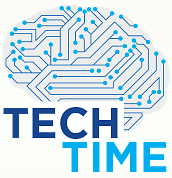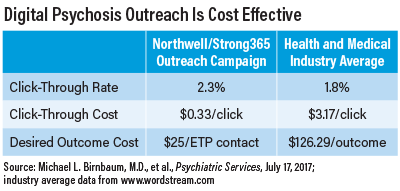Taking a page from the corporate world, a team at New York’s Northwell Health Early Treatment Program (ETP) collaborated with the advocacy group Strong365 to develop an online, search-based advertising campaign aimed at teens and young adults who may be experiencing early psychosis.
This digital advertising approach proved effective at engaging individuals searching the Internet for mental health information, according to a study published online July 17 in Psychiatric Services in Advance.
“In many ways it makes perfect sense,” study co-author Chantel Garrett, the founding director of the nonprofit Strong365, told Psychiatric News. “Using digital advertising reaches people right at the moment they are engaged in help-seeking behavior.”
Over the 14-week period the ad campaign ran, the early intervention ads appeared 191,313 times and received 4,350 clicks (2.3 percent click rate). Each click directed users to a landing page that offered links to Northwell’s ETP; an online form for submitting questions to ETP staff; and the Prodromal Questionnaire–Brief (PQ-B), an evidence-based screening tool that visitors to the page could use to assess psychosis risk.
“From a marketing perspective, this was quite exciting, as the click-through rates were substantially higher than what you typically see for pay-per-click ads related to health care,” said Garrett.
More exciting was that once on the landing page, many visitors stayed and looked around; 44 percent of visitors obtained educational materials or viewed videos, 15 percent completed the self-assessment, and a little over 1 percent reached out to the ETP.
Lead author Michael Birnbaum, M.D., ETP program director and an assistant professor at Hosftra Northwell School of Medicine in Hempstead, N.Y., told Psychiatric News that these data reveal the important next steps for developing a larger, sustained ad campaign.
A total of 453 individuals who took the PQ-B screened positive for psychosis, yet as indicated, only a small number of them ended up contacting the ETP. These findings suggest that “it may not be reasonable to assume that just because someone is online looking for information, they are ready to come to my office right away,” he said.
Birnbaum suggested that the gap between looking and contacting could be bridged with additional online resources, including self-help tools such as coping strategies or cognitive training exercises or access to a chat room for people in the early stages of psychosis.
More work is also needed to refine the search parameters to reach more targeted audiences, he added.
Garrett and members of Strong365’s National Youth Leadership Board served as the creative force behind the first round of ads tested in the study. The board consists of teens and young adults who all have personal experience with psychosis recovery (whether directly or through a family member). The Strong365 board also reached out to online psychosis communities to gain further insight into how people use the Internet to understand this disorder.
Searches of more than 2,000 key words spread across 15 psychosis-related themes such as hallucinations, delusions, and cognitive difficulties led to the placement of short ads—consisting of a headline, description line, and call to action—on a users’ page. Most of the key words were familiar clinical terms, including “runaway thoughts” or “hearing voices,” but there were also more esoteric inclusions like “the Illuminati” or “speaking to God.”
Including a variety of search terms was done in recognition of how different the psychosis experience can be for every person and in hopes that the ads would reach a broad audience, Garrett explained.
The group generated a total of 154 ads, Garrett said, each requiring careful consideration of the users. “On the one hand, you want the ads to come across as genuine, but you cannot get too pointed since that may feel intrusive to someone coping with paranoia,” she said.
Based on Google analytics, the Strong365 team seems to have found the right balance, but more questions remain:
“Are these parents of people experiencing psychosis or the people themselves?” Garrett asked. “And if it’s someone experiencing psychosis, has the person had problems for only 10 minutes or 10 years?”
The group hopes that probing the data contained in the Google analytics system will help them learn more about the people coming to the ETP site as the next phase of the campaign is being planned. ■
“Using Digital Media Advertising in Early Psychosis Intervention” can be accessed
here.



